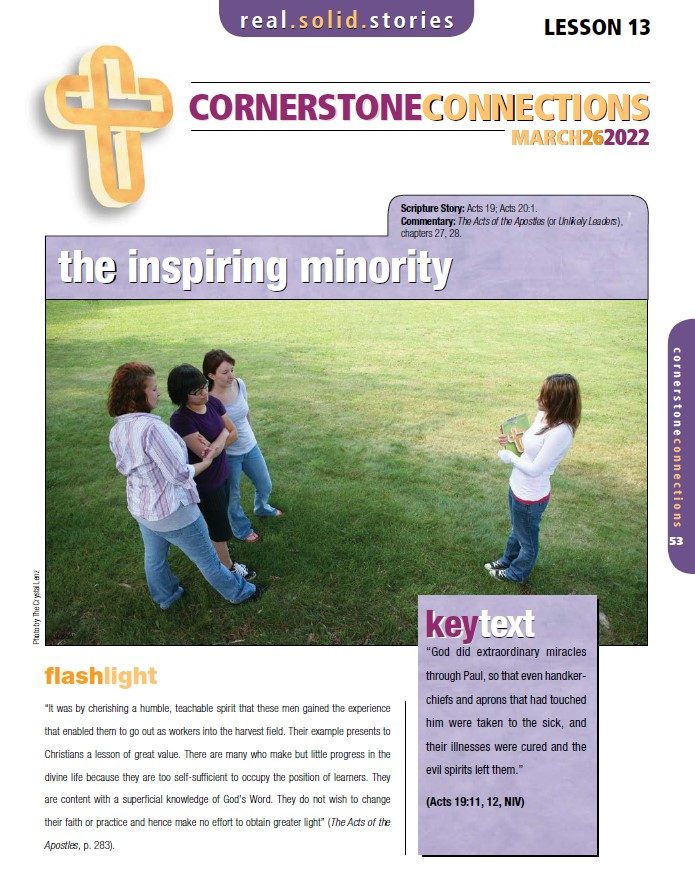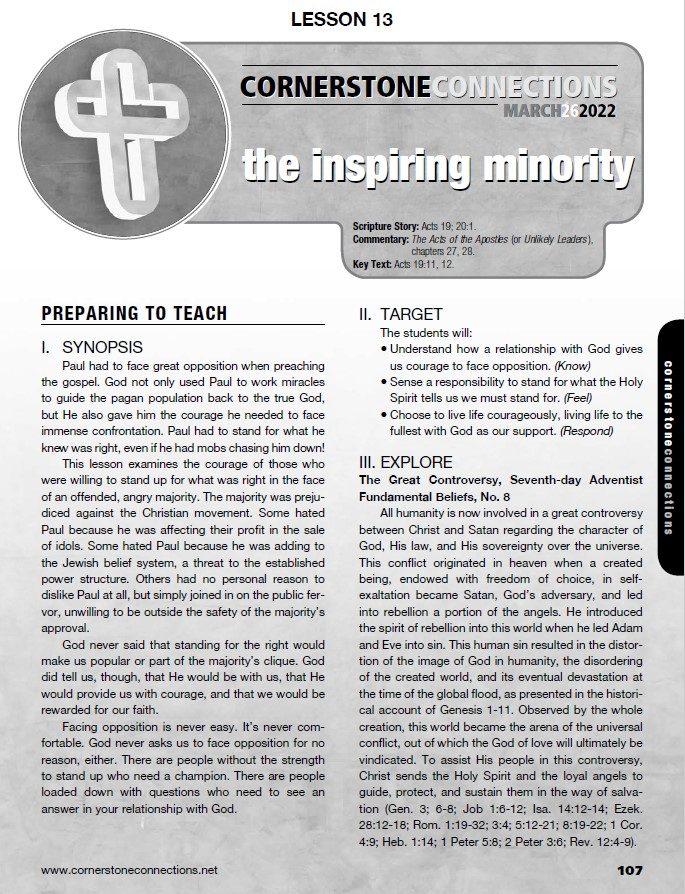“The Inspiring Minority”
Click below to download the Cornerstone Connections leader’s guide and student lesson. This week’s resources also include two lesson plans and a discussion starter video which offer different ways of looking at the topic. Each lesson plan includes opening activities, scripture passages, discussion questions, and real-life applications.
Paul made some enemies by his preaching—he cut into the sale of idols. But God never said that standing for the right would make us popular.
SCRIPTURE PASSAGES
OVERVIEW
Paul’s Faith Marathon. A marathon is 26.2 miles, and is not something a person wakes up one morning and decides to do on the spot. Before a person can run a marathon, they need several months of dedicated training. When we look at the life and legacy of Paul the Apostle, we see an amazing faith marathon! He traveled to many places, teaching and associating with diverse groups of people. He shared the gospel of Jesus with individuals ranking from the poorest in need to the top officials in government. For example, at the beginning of Acts 19, Paul is spending three months in the synagogue at Ephesus speaking boldly about the kingdom of God (verse 8). Then, when the people ask him to leave, he goes to the lecture hall of Tyrannus and spends two years daily engaging in discussion with people about the Word of God (verses 9 and 10). Time was not a limitation for Paul, because he had the higher call from Jesus on his life. He continued to testify of Jesus with passion and perseverance.

OPENING ACTIVITY:
STICK-TO-ITIVENESS
Practice the concept of perseverance by searching for safety pins in a bowl of rice while blindfolded. It is not as easy as it sounds. When your fingers touch the rice and the safety pins they feel the same. Allow each person, or chose five volunteers from a large group, to come forward and try the challenge. They must retrieve 10 safety pins in 60 seconds while blindfolded. Encourage them to not give up and keep trying! Discuss what it means to have the character trait of stick-to-itiveness.
QUESTIONS

BIBLE STUDY GUIDE
Read each Bible passage, then discuss the questions. If you are still worshiping from home, consider discussing one or more of the questions on social media, in a Zoom meeting, or in a group chat with friends.
Paul’s Mission
Read Matthew 28:18-20.
18 Then Jesus came to them and said, “All authority in heaven and on earth has been given to me. 19 Therefore go and make disciples of all nations, baptizing them in the name of the Father and of the Son and of the Holy Spirit, 20 and teaching them to obey everything I have commanded you. And surely I am with you always, to the very end of the age.”
QUESTIONS
Paul’s Protection
Read Ephesians 6:10-18.
10 Finally, be strong in the Lord and in his mighty power. 11 Put on the full armor of God, so that you can take your stand against the devil’s schemes. 12 For our struggle is not against flesh and blood, but against the rulers, against the authorities, against the powers of this dark world and against the spiritual forces of evil in the heavenly realms. 13 Therefore put on the full armor of God, so that when the day of evil comes, you may be able to stand your ground, and after you have done everything, to stand. 14 Stand firm then, with the belt of truth buckled around your waist, with the breastplate of righteousness in place, 15 and with your feet fitted with the readiness that comes from the gospel of peace. 16 In addition to all this, take up the shield of faith, with which you can extinguish all the flaming arrows of the evil one. 17 Take the helmet of salvation and the sword of the Spirit, which is the word of God.
18 And pray in the Spirit on all occasions with all kinds of prayers and requests. With this in mind, be alert and always keep on praying for all the Lord’s people.
QUESTIONS
Paul’s Perseverance
Read Galatians 6:9.
9 “Let us not become weary in doing good, for at the proper time we will reap a harvest if we do not give up.”
QUESTIONS
SUMMARY
Paul gives us a great example of perseverance in sharing the gospel and helping lost people find Jesus. We are called in the great commission from Jesus to share our faith. The Holy Spirit is our helper and guide. Being a Christian is not a sprint, but rather a series of marathons we continue to train for and run as “disciple-making” disciples of Jesus.

APPLICATION
Consider applying what you learned in this week’s lesson by doing one or all of these activities:
Set a goal to be more confident about sharing your faith. Brainstorm creative ways you can easily tell people about what Jesus means to you.

SCRIPTURE PASSAGE
LEADER’S NOTE
For a Relational Bible Study (RBS) you’ll want to get into the Scripture passage and encourage the youth to imagine participating in the story while it’s happening. Then you will be able to better apply it to your own situation today.
You will need to ask God for the Holy Spirit to be present as your small group discusses the questions (no more than 3-6 people in a group is recommended). Start with the opening question. It is a personal question and the answer is unique for each individual. There is no right answer and nobody is an expert here, so don’t be surprised when you hear different responses. You are depending on the Holy Spirit to be present and to speak through your group. Say what God prompts you to say, and listen to what others share.
Take turns reading the chapter out loud. Follow that with giving the students some time to individually mark their responses to the questions (a PDF version of the handout is available as a download). This gives each person a starting point for responding when you start to share as a group. Next, begin the discussion by asking the students to share what they marked and why on each question as you work your way through. Feel free to take more time on some questions than others as discussion warrants.
Encourage each person in the group to apply what is discussed to their personal lives and to share with the group what they believe God wants them to do. Then ask them to pray that God will help each of them to follow through in doing so. Remind them to expect that God will show them ways to live out the message of this passage in the coming week, and that they are free to ask others in the group to help hold them accountable.
OVERVIEW
Acts 19 is a stunning chapter concerning the advancement of Christianity. The aerial view of the chapter captures Paul during his Ephesian ministry. First, we see disciples of John the Baptist become Christians. Then, we see Paul teaching in the synagogue and in the school of Tyrannus. We also see God working through Paul with many miracles.
While at Ephesus, two major aspects of Paul’s ministry arose—the desire to see Rome and the plan to take an offering to the Jerusalem church. He was determined to do both, even though he continued teaching, preaching, and working miracles.
As Paul’s efforts advanced the Christian faith, Christianity started to threaten the business and reputation of Ephesian idolatry (19:23–27). The small silver shrines housed miniature figures of Artemis that worshipers would purchase and dedicate in the temple. Gaius (19:29) was from Derbe (20:4) and Aristarchus from Thessalonica (27:2). These companions of Paul were caught during this struggle. They were seized and taken into the theatre.
The two-hour shouting match in the stadium (19:28–34) ended with the mayor persuading the crowd to disperse (19:35–41). The mayor was the most important man in Ephesus. His argument that truth should order their action (19:35–36, 40) provides a most eloquent sermon from an idolator. Again, Christianity was shown to be innocent of causing riots or spreading sedition.
EXPERIENCING GOD’S POWER
Describe the most powerful thing that has happened in your life.
Read Acts 19:1-41.
1While Apollos was at Corinth, Paul took the road through the interior and arrived at Ephesus. There he found some disciples 2 and asked them, “Did you receive the Holy Spirit when you believed?”
They answered, “No, we have not even heard that there is a Holy Spirit.”
3 So Paul asked, “Then what baptism did you receive?”
“John’s baptism,” they replied.
4 Paul said, “John’s baptism was a baptism of repentance. He told the people to believe in the one coming after him, that is, in Jesus.” 5 On hearing this, they were baptized in the name of the Lord Jesus. 6 When Paul placed his hands on them, the Holy Spirit came on them, and they spoke in tongues and prophesied. 7 There were about twelve men in all.
8 Paul entered the synagogue and spoke boldly there for three months, arguing persuasively about the kingdom of God. 9 But some of them became obstinate; they refused to believe and publicly maligned the Way. So Paul left them. He took the disciples with him and had discussions daily in the lecture hall of Tyrannus. 10 This went on for two years, so that all the Jews and Greeks who lived in the province of Asia heard the word of the Lord.
11 God did extraordinary miracles through Paul, 12 so that even handkerchiefs and aprons that had touched him were taken to the sick, and their illnesses were cured and the evil spirits left them.
13 Some Jews who went around driving out evil spirits tried to invoke the name of the Lord Jesus over those who were demon-possessed. They would say, “In the name of the Jesus whom Paul preaches, I command you to come out.” 14 Seven sons of Sceva, a Jewish chief priest, were doing this. 15 One day the evil spirit answered them, “Jesus I know, and Paul I know about, but who are you?” 16 Then the man who had the evil spirit jumped on them and overpowered them all. He gave them such a beating that they ran out of the house naked and bleeding.
17 When this became known to the Jews and Greeks living in Ephesus, they were all seized with fear, and the name of the Lord Jesus was held in high honor. 18 Many of those who believed now came and openly confessed what they had done. 19 A number who had practiced sorcery brought their scrolls together and burned them publicly. When they calculated the value of the scrolls, the total came to fifty thousand drachmas. 20 In this way the word of the Lord spread widely and grew in power.
21 After all this had happened, Paul decided to go to Jerusalem, passing through Macedonia and Achaia. “After I have been there,” he said, “I must visit Rome also.” 22 He sent two of his helpers, Timothy and Erastus, to Macedonia, while he stayed in the province of Asia a little longer.
The Riot in Ephesus
23 About that time there arose a great disturbance about the Way. 24 A silversmith named Demetrius, who made silver shrines of Artemis, brought in a lot of business for the craftsmen there. 25 He called them together, along with the workers in related trades, and said: “You know, my friends, that we receive a good income from this business. 26 And you see and hear how this fellow Paul has convinced and led astray large numbers of people here in Ephesus and in practically the whole province of Asia. He says that gods made by human hands are no gods at all. 27 There is danger not only that our trade will lose its good name, but also that the temple of the great goddess Artemis will be discredited; and the goddess herself, who is worshiped throughout the province of Asia and the world, will be robbed of her divine majesty.”
28 When they heard this, they were furious and began shouting: “Great is Artemis of the Ephesians!” 29 Soon the whole city was in an uproar. The people seized Gaius and Aristarchus, Paul’s traveling companions from Macedonia, and all of them rushed into the theater together. 30 Paul wanted to appear before the crowd, but the disciples would not let him. 31 Even some of the officials of the province, friends of Paul, sent him a message begging him not to venture into the theater.
32 The assembly was in confusion: Some were shouting one thing, some another. Most of the people did not even know why they were there. 33 The Jews in the crowd pushed Alexander to the front, and they shouted instructions to him. He motioned for silence in order to make a defense before the people. 34 But when they realized he was a Jew, they all shouted in unison for about two hours: “Great is Artemis of the Ephesians!”
35 The city clerk quieted the crowd and said: “Fellow Ephesians, doesn’t all the world know that the city of Ephesus is the guardian of the temple of the great Artemis and of her image, which fell from heaven? 36 Therefore, since these facts are undeniable, you ought to calm down and not do anything rash. 37 You have brought these men here, though they have neither robbed temples nor blasphemed our goddess. 38 If, then, Demetrius and his fellow craftsmen have a grievance against anybody, the courts are open and there are proconsuls. They can press charges. 39 If there is anything further you want to bring up, it must be settled in a legal assembly. 40 As it is, we are in danger of being charged with rioting because of what happened today. In that case we would not be able to account for this commotion, since there is no reason for it.” 41 After he had said this, he dismissed the assembly.
1. What is the meaning of baptism to you?
2. Some people believed Paul and some scoffed; what was the distinction?
3. How does God work in and through people?
4. What do you think will cause a stir, like the one in Ephesus?
5. What was the main issue of the Ephesus riot?
6. What would have been your response if you were in Ephesus?
7. Describe a time when you stood up for God in the face of odds.
8. In what ways do you have the urge to speak up for God now?
SUMMARY
What a chapter! Luke has taken us from a group of “disciples” who had not heard that the Holy Spirit had come (even though Pentecost occurred over two decades earlier) through healings brought about by sweaty towels touched by Paul; past the naked and bleeding seven sons of Sceva; to a city riot in the great theater of Diana. What a chapter! And what a city!
Paul had spent nearly three years here, but now it was time to leave. Yet we know from his later letter to this church how deep and genuine their faith had become. That letter stresses spiritual blessings in Christ and the need to live a lifestyle which reflects those blessings. Only when we see that in context of this chapter can we appreciate what it must have been like to be a believer in the fledgling church at Ephesus.

APPLICATION
This chapter has pitted spirit against spirit, evil spirits against the Spirit of God. Surely by the end of Paul’s ministry there, the Ephesian believers had grasped the enormous significance of God’s power active in them as a defense and antidote to the darkness all around them.
Below, find some application activities to reinforce this lesson. These are simply to provide ideas, or to invite you to imagine and create some of your own, as you impact the lives of teens for God’s glory.
As a class, partner with the local police to learn more about how you can help keep the peace.
Invite a police officer to your class (maybe a member of your church or contact the local police department) and ask them to share ideas.
Engage them in reading the scriptures with you as a group.
Agree to do one of the ideas they present to you.
As a class, or even as an individual, talk with your senior or youth pastor to guide you in planning and conducting a Bible class.
With permission and supervision plan to connect with some of your peers or some of the younger ones in your church to be a part of this class.
As you teach the class think about Paul as he taught the Ephesians. (Make sure you really celebrate at the baptism [or other major decision] of your peers or the younger kids.)
Work with your pastor(s) to select an area of your community that has a lot of needs.
As a class, decide which need you would like to meet.
Like Paul (he wanted to gather up some money for the church at Rome to help them accomplish their mission) take up a collection (over a period of time if you have to).
Then send the money to take care of the need. (It may be a good thing to even share stories among yourselves as to how each person came up with the money to give—you might be surprised at some of the answers.)
Stay in contact with those you share the money (or other resources) with to see how they took care of the needs.
Share the stories of your interaction with the community with the rest of the church.





